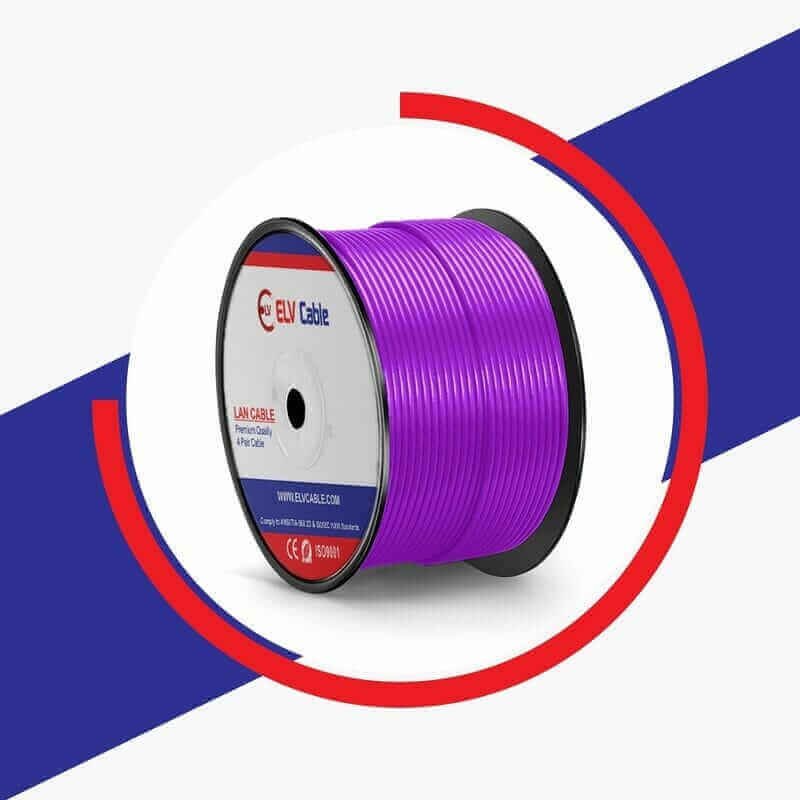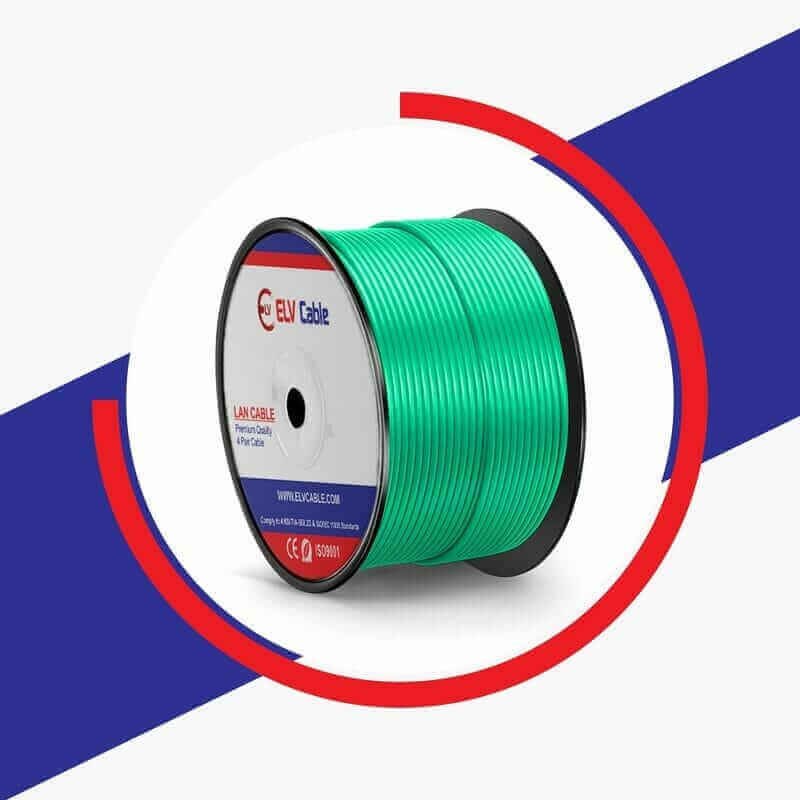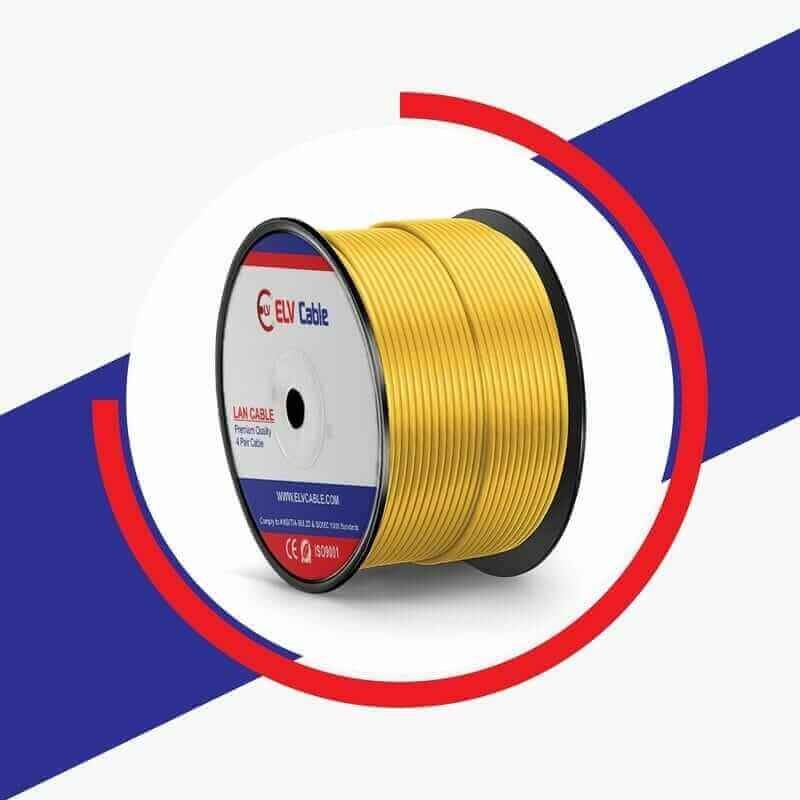Blog
Understanding CCTV Camera Network Cable: The ELV Cables Advantage

Introduction to CCTV Camera Network Cables
CCTV camera network cables are integral components of video surveillance systems, facilitating the transmission of video and data signals from cameras to recording devices or monitors. These cables, specifically designed for high-definition video transfer, ensure that the visual information captured by CCTV cameras is transmitted accurately without significant loss of quality. The role of these cables cannot be overstated, as they directly impact the effectiveness and reliability of surveillance operations.
The quality of cabling is paramount in a CCTV setup, as it influences the clarity and stability of the video feed. High-quality network cables, such as those categorized as ELV (Extra Low Voltage) cables, provide advantages such as minimal signal degradation over long distances and resistance to electromagnetic interference. This quality is essential for maintaining the integrity of the data being transmitted, ensuring that the surveillance system functions optimally under various environmental conditions.





Moreover, selecting the appropriate type of cable affects the overall functionality of CCTV systems. Different cables serve distinct purposes; for instance, coaxial cables are often used for analog cameras, while network cables like Cat5e or Cat6 are utilized for IP-based cameras. Each cable type has specific characteristics that cater to various surveillance requirements, highlighting the importance of informed decision-making when designing a CCTV installation.
In the realm of modern surveillance, the shift towards digital systems has made network cables crucial for supporting high-resolution video feeds and advanced features such as remote access and control. Thus, understanding the function and advantages of CCTV camera network cables is vital for anyone involved in the installation or maintenance of these systems, ensuring that the chosen cabling solution aligns with the specific needs of the surveillance application.
Importance of Choosing the Right Cable for CCTV Systems
Selecting the appropriate cable for Closed-Circuit Television (CCTV) systems is critical in ensuring optimal performance and longevity. The type of cable used can significantly impact video quality, reliability, and overall system efficiency. Among various options, ELV cables stand out due to their design tailored for low-voltage applications, which makes them a preferred choice for CCTV installations.
Video quality is one of the foremost concerns when installing a CCTV system. High-quality cables minimize signal loss, ensuring that the footage captured is clear and detailed. This clarity is essential for identification purposes and can be crucial in legal scenarios. When installing CCTV systems, choosing cables that support high-definition video transmission will enhance visual accuracy, providing reliable surveillance data for analysis.
Furthermore, the reliability of a CCTV system hinges on its cable infrastructure. Cables exposed to external elements, including weather conditions and potential interference, must be durable and resistant. By opting for specialized CCTV cables like ELV cables, users can benefit from an enhanced level of protection against electromagnetic interference and physical damage, which in turn boosts the overall reliability of the surveillance system.
Installation ease is another critical factor. High-quality cables are often designed for straightforward installation, with features such as flexibility and compatibility with various connectors. This can significantly reduce the time and effort required to set up a surveillance system. Additionally, investing in top-notch cables facilitates easier future upgrades or expansions of the system without necessitating a complete overhaul.
Long-term performance also cannot be overlooked. Cables that are resistant to wear, tear, and environmental factors will often lead to lower maintenance costs over time. By choosing the right Cable for CCTV systems, users can ensure enhanced performance and longevity, ultimately offering peace of mind in terms of security.
Introducing ELV Cables: A Trusted Name in Network Cabling
In the rapidly evolving world of surveillance technology, the choice of cable can significantly impact the performance and reliability of CCTV systems. ELV Cables has emerged as a leading manufacturer, recognized for its commitment to producing high-quality network cables tailored for CCTV installations. Established with a vision to innovate and enhance security solutions, ELV Cables has built a reputation for excellence within the industry.
The history of ELV Cables showcases a consistent dedication to research and development in the field of low-voltage cables. With years of experience, the company has honed its expertise, delivering products that not only meet but often exceed industry standards. Its extensive product range is specifically designed to provide seamless connectivity and optimal performance for surveillance systems, making it a preferred choice for professionals in the field.
ELV Cables employs advanced manufacturing processes, utilizing top-grade materials that ensure durability and longevity. The company’s focus on quality assurance is evident in its rigorous testing protocols, which guarantee that each cable can withstand various environmental conditions while maintaining high performance. These qualities make ELV Cables a trusted name in network cabling, particularly for those seeking reliable solutions for CCTV applications.
Furthermore, ELV Cables has positioned itself as a provider of tailored solutions, understanding that different projects may require unique specifications. This flexibility has enabled the company to cater to a wide range of clients, from small-scale installations to large security networks. As a result, ELV Cables is not just another manufacturer; it is a partner to professionals in the security industry, ensuring the delivery of robust and efficient network cabling solutions.
Key Features of ELV Cables’ CCTV Network Cables
ELV Cables has established itself as a reliable provider of CCTV network cables, specifically designed to meet the demands of modern surveillance systems. One of the primary distinguishing features of their network cables is the high-quality materials utilized in the manufacturing process. By employing superior-grade copper conductors, ELV Cables ensures enhanced conductivity, which is critical for maintaining strong signal integrity over longer distances. This quality contributes to a more reliable connection for surveillance systems, reducing the risk of data loss and video transmission interruptions.
Another notable feature of ELV Cables’ offerings is the variety of shielding options available. The cables are equipped with advanced shielding technologies, including foil and braided shields, that mitigate the effects of electromagnetic interference (EMI) and radio frequency interference (RFI). This is especially crucial in urban environments, where dense electronic traffic can disrupt surveillance signals. By employing these robust shielding techniques, ELV Cables enhances the overall performance and reliability of their CCTV network cables.
Length variations also play a vital role in the adaptability of these cables for various installation scenarios. ELV Cables provides an extensive range of cable lengths, allowing users to choose the most suitable option for their specific requirements. This flexibility reduces installation complexities and minimizes the need for excessive splicing, which can decrease signal quality. Furthermore, the cables are designed for optimal flexibility, ensuring ease of handling and installation in tight spaces or around challenging bends.
In addition to these features, ELV Cables’ CCTV network cables exhibit impressive weather resistance. This characteristic is vital for outdoor applications, where exposure to harsh environmental conditions can compromise cable performance. With superior packaging materials designed to withstand UV rays, moisture, and temperature fluctuations, customers can have confidence in the durability and longevity of their investment. Overall, these features collectively enhance the practicality and effectiveness of CCTV applications.
Comparing ELV Cables with Competitors
In the realm of CCTV camera installations, selecting the right cable is crucial for optimal performance and reliability. ELV cables, known for their enhanced functionality and cost-effectiveness, have steadily gained recognition when compared against major competitors in the market. Analyzing various performance metrics, pricing structures, customer satisfaction rates, and warranty offerings provides insight into why ELV cables may offer better value for CCTV applications.
From a performance standpoint, ELV cables typically exhibit superior transmission capabilities over longer distances without signal degradation. This advantage is particularly significant for CCTV systems, as clear video quality is essential for surveillance. Many competitors’ cables may struggle with maintaining integrity at extended lengths, which can result in compromised footage and reduced effectiveness of security systems. Additionally, ELV cables often incorporate enhanced shielding features, minimizing interference from external electromagnetic sources, thus ensuring consistent operation.
When it comes to pricing, ELV cables generally present a cost-efficient solution for end-users. While some competitors may initially appear cheaper, they often come with hidden costs, including frequent replacements or additional expenditures for signal boosters. ELV cables, designed for longevity and reliability, often offer an overall lower cost of ownership. Customer satisfaction surveys reflect this sentiment, with many users reporting a favorable experience with ELV cables in terms of durability and performance.
Warranty offerings also play a significant role in the consumer decision-making process. ELV cables typically come with extensive warranties that reflect the manufacturer’s confidence in their product quality. In contrast, many competitors offer limited warranties, leaving customers with inadequate coverage. This factor contributes to customer reluctance when considering alternatives to ELV cables.
Through a thoughtful comparison of these various aspects, it becomes evident that ELV cables provide a compelling option for CCTV installations, outshining many competitors in critical areas that impact overall system effectiveness and user satisfaction.
Real-World Applications of ELV Cables in CCTV Systems
In the realm of CCTV systems, Enhanced Low Voltage (ELV) cables have proven to be indispensable due to their versatility and reliability. Numerous case studies and real-world examples illustrate their effectiveness across a diverse range of environments, including residential, commercial, and municipal settings. One notable application is in residential installations where homeowners seek enhanced security. Using ELV cables, they can connect multiple CCTV cameras to a single digital video recorder (DVR). This configuration facilitates seamless surveillance, allowing for extensive coverage of the property while ensuring crisp video quality and improved data transmission.
Commercial installations also showcase the advantages of ELV cables. For example, a shopping mall integrated a comprehensive CCTV system employing ELV cable technology to link various cameras situated throughout the premises. This setup not only granted security personnel real-time monitoring capabilities but also enabled significant cost savings on installation as ELV cables are generally lighter and easier to handle than standard cabling. Moreover, their ability to transmit power and data simultaneously simplifies installation processes while enhancing system efficiency.
Municipal applications further highlight the adaptability of ELV cables in CCTV systems. Many cities have deployed CCTV cameras in public areas to enhance security and monitor traffic. A case study in an urban environment demonstrated how the use of ELV cables facilitated the installation of a city-wide surveillance network. The network effectively connected various cameras located in high-traffic regions while ensuring they delivered high-quality images to monitoring centers. The successful deployment of ELV cables in these projects emphasizes their reliability in supporting extensive surveillance systems.
As demonstrated through various case studies, the implementation of ELV cables in CCTV systems showcases their crucial role in ensuring effective surveillance solutions across different contexts. This adaptability illustrates why these cables have become a preferred choice in designing modern security infrastructures.
Installation Guidelines for ELV CCTV Network Cables
When installing ELV CCTV network cables, adhering to best practices is essential to ensure optimal performance and longevity of the system. One of the first considerations is the length of the cables. ELV cables are designed for optimal performance over certain distances; typically, the maximum length for effective signal transmission should not exceed 100 meters (328 feet). Exceeding this limit can lead to signal degradation, which may adversely affect the quality of the video feed.
Routing is another crucial consideration. It is advisable to plan the cable routes carefully, minimizing bends and ensuring that cables are not exposed to high electromagnetic interference (EMI). Cables should ideally be kept at least 30 cm (12 inches) away from power lines or other sources of interference. Additionally, using cable trays or conduits can help protect the cables from physical damage while providing a cleaner installation.
Connection methods play a vital role in maintaining the integrity of the network cabling. Employing proper termination techniques at both ends of the cables is necessary to avoid issues like crosstalk and interference. Utilizing connectors that are suitable for the specific type of ELV cable can further enhance the reliability of the connections. It’s recommended to use solid core cables for long runs, especially in fixed installations, while stranded cables can be beneficial in areas requiring flexibility.
Finally, post-installation testing is necessary to verify that the system is functioning as intended. Testing tools can help check for signal strength, continuity, and any potential issues that may arise from improper installation. Regular maintenance and inspection of the cabling should also be planned, as environmental factors may lead to wear over time. By following these guidelines, users can ensure their ELV CCTV cable installation operates efficiently, allowing for effective surveillance and security monitoring.
Maintenance and Troubleshooting of CCTV Network Cables
Effective maintenance and troubleshooting of CCTV network cables, particularly ELV (Extra Low Voltage) cables, are crucial for ensuring peak performance and longevity of surveillance systems. Regular inspections of the cables should be performed to identify potential wear and tear, which can result in transmission issues. Checking for physical damage, such as cuts, kinks, or abrasions, is paramount. Additionally, visually assessing the cable’s connectors and junctions is necessary to ensure they are secure and free from corrosion.
One common issue with ELV cables is signal degradation, which can lead to reduced video quality. This can be caused by various factors, such as cable length exceeding recommended limits or interference from nearby electrical equipment. To mitigate these problems, it is vital to adhere to the manufacturer’s specifications regarding cable length and routing. The use of high-quality connectors can also minimize signal loss.
Preventative measures can be beneficial in extending the life of network cables. Employing protective conduits can safeguard cables from physical damage, moisture, and environmental factors. Keeping cables organized and avoiding sharp bends can reduce stress on the cable and maintain optimal performance. Furthermore, routine testing of the network integrity using cable testers can help identify faults before they cause significant disruptions to the CCTV system.
In the event of a malfunction, having a structured troubleshooting process can greatly improve response times and outcomes. Start by verifying power supply and ensuring that all connections are intact. If issues persist, utilize a multimeter to check for continuity or breaks in the cable. Identifying problems early on not only preserves the functionality of the surveillance system but also prevents costly repairs or replacements down the line.
By adhering to these maintenance guidelines and troubleshooting tips, users can significantly enhance the reliability of their CCTV networks that utilize ELV cables. Ensuring reliable operation through proactive measures will contribute to effective monitoring and security.
Conclusion: The Future of CCTV with ELV Cables
As we have explored throughout this blog post, the landscape of CCTV technology is continuously evolving, driven by the need for improved surveillance systems. The role of high-quality network cables, particularly those offered by ELV, is paramount in this advancement. ELV cables not only support high-definition video transmission but also ensure reliable connectivity, which is crucial for modern surveillance operations.
The integration of ELV cables leads to superior performance in video surveillance systems, providing clearer images and reduced latency. This is particularly important in environments where detail is paramount for security, such as retail establishments and public areas. ELV cables enhance the overall efficacy and responsiveness of CCTV systems, enabling real-time monitoring and quicker response times to incidents.
In addition, the growing trend towards smart cities and increased automation reflects a future where CCTV systems will be increasingly interconnected. The robust design and features of ELV cables will be indispensable as more devices and sensors are incorporated into surveillance frameworks. This interconnectedness not only enhances security but also offers valuable data collection opportunities, paving the way for intelligent analytics and improved safety measures.
Furthermore, as consumers and organizations continue to prioritize security, there is a growing demand for systems that are not only effective but also easy to manage and maintain. ELV cables, with their streamlined installation processes and compatibility with a variety of CCTV equipment, position themselves as a viable solution for both new installations and upgrades to existing systems.
In conclusion, the future of CCTV technology will largely depend on the development and use of high-quality network cables like those provided by ELV. As the need for enhanced security measures rises, ELV cables signify a crucial advancement, facilitating the implementation and effectiveness of modern video surveillance systems.
